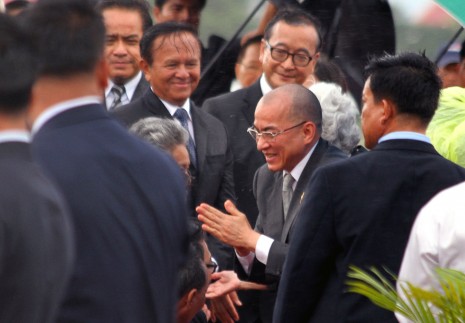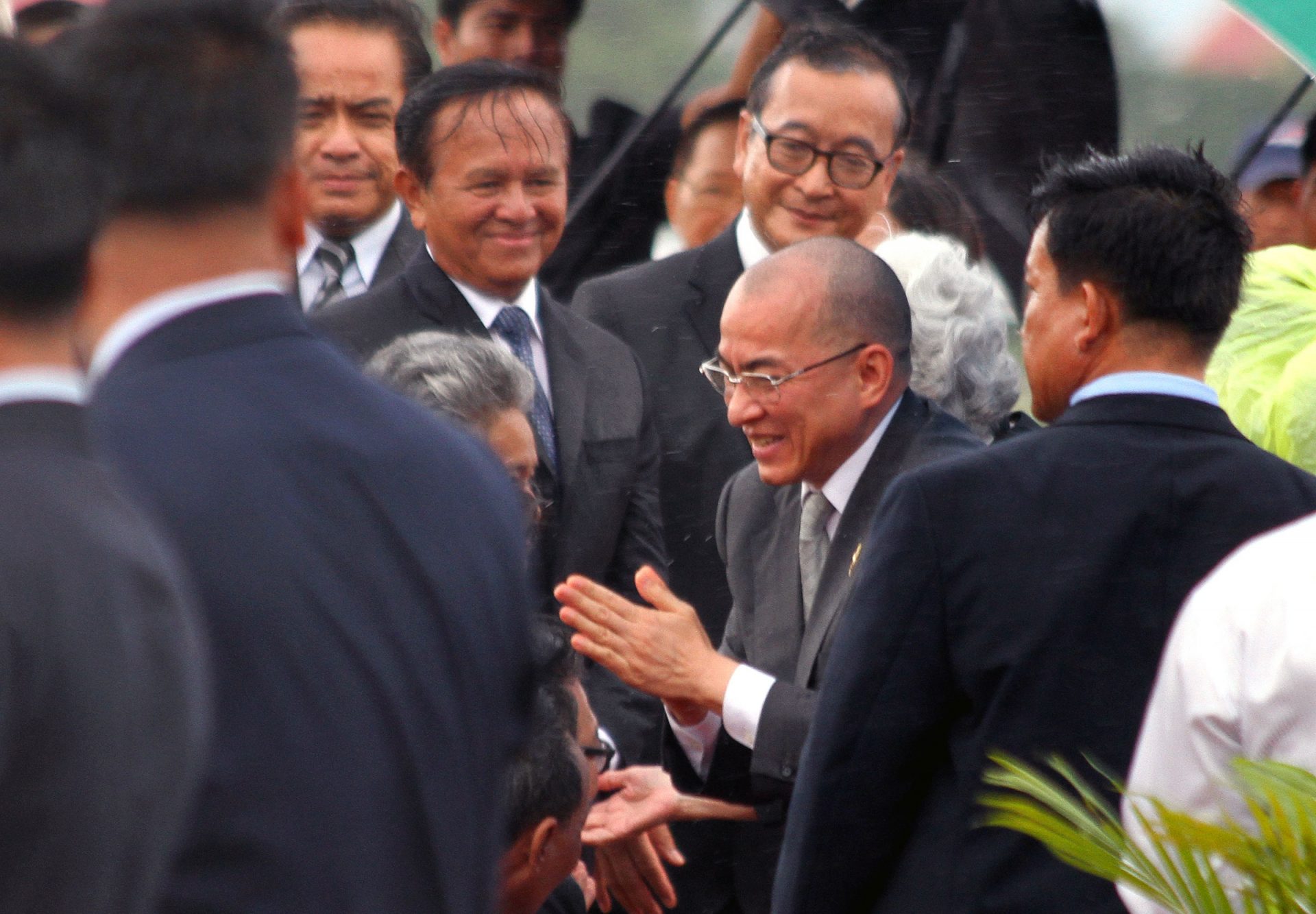Prime Minister Hun Sen and opposition leader Sam Rainsy exchanged not so much as a handshake during the return of King Norodom Sihamoni from China at Phnom Penh International Airport on Wednesday, the first time the perennial political rivals have appeared together in public for years.
Dashing speculation that they might take the chance to discuss the country’s political deadlock since July’s much-disputed national election, which both Mr. Hun Sen’s ruling CPP and Mr. Rainsy’s CNRP are claiming to have won, the two men dutifully took turns to shake King Sihamoni’s hand on the tarmac but studiously ignored one another.

The King was returning from a routine medical visit to China with Queen Mother Monineath. He is now scheduled to convene on September 23 the first meeting of the National Assembly since the bitterly contested election, which was officially won by the CPP though the result has been rejected by the opposition CNRP.
During their brief exchange at the airport, Mr. Rainsy said the King thanked him for attending his return.
“He said ‘thank you’ to me and the delegates who came to greet him, and the Queen Mother [Norodom Monineath] said the same. There was no surprise,” Mr. Rainsy said.
And though he and Mr. Hun Sen awaited the King’s arrival inside the same VIP building at the airport, Mr. Rainsy denied rumors that they had met in private.
“We [the CNRP delegates] came to greet him [the King] separately,” the opposition leader said. “I didn’t pay attention to which other guests came to greet the King.”
Opposition lawmaker Mu Sochua, who also attended the King’s return, categorically denied the rumor.
Though Mr. Rainsy has for weeks threatened to boycott the inaugural National Assembly session in hopes of forcing an independent investigation of voting day irregularities, which he claims robbed the CNRP of victory, the opposition leader on Wednesday reiterated remarks he made Tuesday that the CNRP would consider attending the opening session if King Sihamoni were to directly ask them.
“We all respect the King so we will wait for the invitation and will take it and consider,” Mr. Rainsy told reporters on Tuesday, having said earlier that it was possible that King Sihamoni could provide convincing reasons to attend the opening of the Assembly.
However, he was non-committal when contacted by telephone after greeting the King at the airport.
“There could be other points which could help us make the appropriate decision. How could we assume the letter from the King will just say ‘I invite you to come’?”
If the CNRP does drop its threatened boycott of the National Assembly before alleged election irregularities are independently investigated, it would not be the first time the party has used an announcement from the King to justify a shift in policy.
The CNRP heavily promoted its first mass demonstration on Saturday, but they downgraded the demonstration to a day of “praying for peace” five days before the event, citing a statement released by King Sihamoni calling for the political parties to solve their problems through “institutions stipulated by the Constitution and laws.”
Independent political analyst Chea Vannath said Wednesday that Mr. Rainsy may be testing the waters to see if supporters would eventually be open to him taking up the position as a strengthened opposition in the National Assembly.
“It could be a good excuse for his supporters, because many supporters do not want him to join the National Assembly,” she said. “Mr. Rainsy has used all the means available so far, and there is no perfect solution and there is no perfect justice, so you have to be pragmatic.”
“Like he said, it’s out of respect. The monarchy is the highest institution in Cambodia,” Ms. Vannath added.
Mr. Rainsy made similar threats to boycott the opening of the National Assembly after the opposition lost the national election in 2008, also amid reports of voting-day irregularities and a playing field tilted heavily in the CPP’s favor.
Just as now, however, Mr. Rainsy began pulling back from the threat weeks out from Parliament’s first session.
His self-named party at the time, the Sam Rainsy Party, finally joined the first session after the CPP promised to amend the Assembly’s internal rules in the opposition’s favor during last-minute negotiations that ended only hours before the swearing-in. But, a month later, the CPP-dominated Assembly rejected the proposed amendments for a lack of lawmakers willing to support them.
Analysts said Wednesday that there was little to be gained for the CNRP if it did decide to attend the Assembly before irregularities were properly investigated.
Some also doubt whether King Sihamoni would go ahead with the opening of Parliament on September 23 in the absence of the re-energized and unified opposition and their 55 elected lawmakers.
The ruling CPP, which now controls a modest 68 parliamentary seats, has maintained in the aftermath of the July 28 election that the National Assembly is constitutionally bound to be formed within 60 days of election day, or before September 28.
Heng Puthea, executive director of the Neutral and Impartial Committee for Free and Fair Elections in Cambodia, said Wednesday that there was no enforcement mechanism to make the National Assembly sit before 60 days. King Sihamoni could open the assembly later if he decided it would be prudent to do so, Mr. Puthea said.
“King Sihamoni is the top person, so he can still decide not to have the opening on September 23,” he said, explaining that the King could theoretically give himself more time to solve disagreements over the election results.
“In past elections, it has not only been 60 days—it has been more than 60 days,” Mr. Puthea said.
“The real issue in Cambodia is for political discussions, so I would hope the King can provide consultation and political discussion, and the Parliament would not open with only the 68 CPP members,” he said.
The National Assembly took 128 days to form after the 1998 election and 355 days to form after the 2003 election, when neither the CPP nor the Alliance of Democrats—a coalition formed between the Funcinpec and Sam Rainsy parties at the time—had won the two-thirds of Assembly seats that were then required to form a government.
“We had this experience in 1993, 1998 and 2003—the same thing happened,” said Koul Panha, executive director for the Committee for Free and Fair Elections in Cambodia.
The formation of the National Assembly in the current mandate could thus be similarly postponed beyond the 60-day period until alleged election irregularities are satisfactorily dealt with, he said.
“So they should spend more time to work on the conflict now, not rush to follow the Constitution’s schedule and then have more conflicts when they start to work in the National Assembly,” Mr. Panha said.
Mr. Panha emphasized that the consequences of not forming a new Assembly within the 60-day period—compared to forming one before serious alleged election irregularities are sorted out—would be minor.
“If they don’t form a new National Assembly, the old National Assembly will continue, and the caretaker government continues,” he said.
Council of Ministers spokesman Phay Siphan rejected any speculation that the opening of Parliament could be postponed.
“The King must follow the schedule, because he is impartial and independent,” he said. “No one should put pressure on him, as the Constitutional Council and the NEC have decided on the irregularities already.”
But Prince Sisowath Thomico, who ran as the CNRP’s lawmaker candidate in Preah Sihanouk province and is a former assistant to both King Sihamoni and late King Father Norodom Sihanouk, said that he believed the King—despite his formal powers—would likely convene the National Assembly on September 23 with or without the CNRP.
“In a communist country, every institution is under the control of the party—that is very clear,” Prince Thomico said.
Carlyle Thayer, a Southeast Asia expert at the Australian Defense Force Academy in Canberra, said that the CNRP should accept the 55 seats it won according to the official results released by the NEC and get to work as an opposition.
“The CPP and Hun Sen are not going to allow a commission to be set up that undermines their rule,” he said. “The only option [for the opposition] is to present yourself everyday—as in an actual functioning democracy—as the alternative government.”
Mr. Thayer added that—unlike successful mass opposition movements like the Indian independence struggle from the U.K. headed by Mahatma Gandhi—continued protests in Cambodia had no one to which to appeal to achieve their demands.
“Who in the CPP is going to push Hun Sen to compromise?”
(Additional reporting by Khuon Narim)




